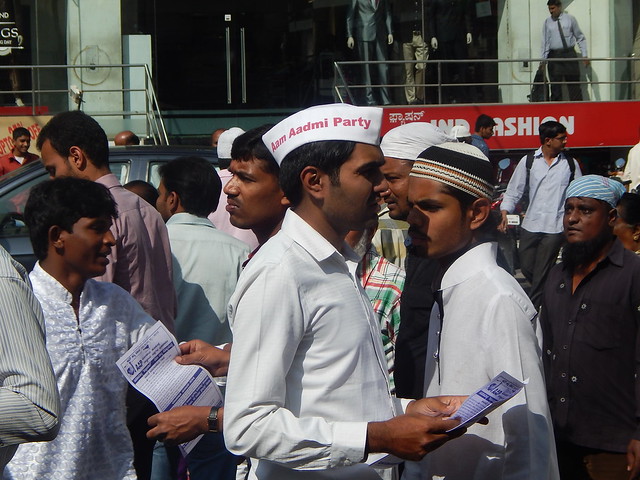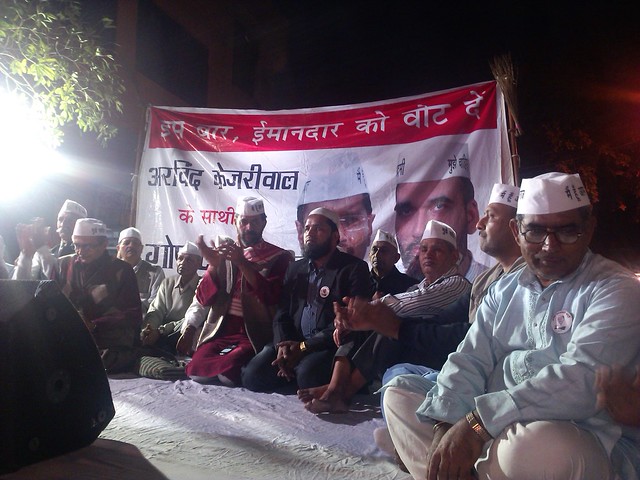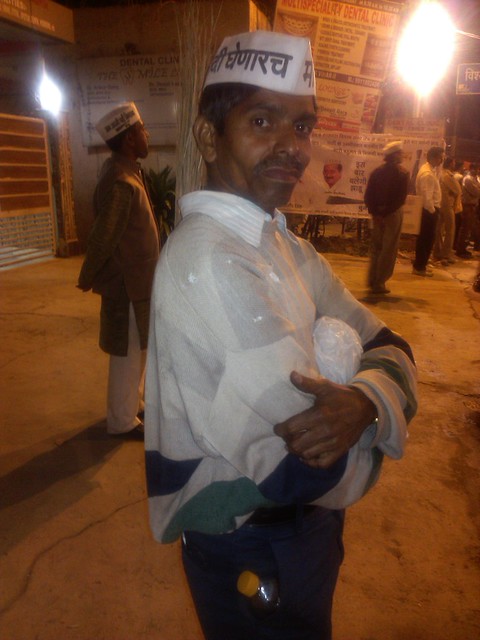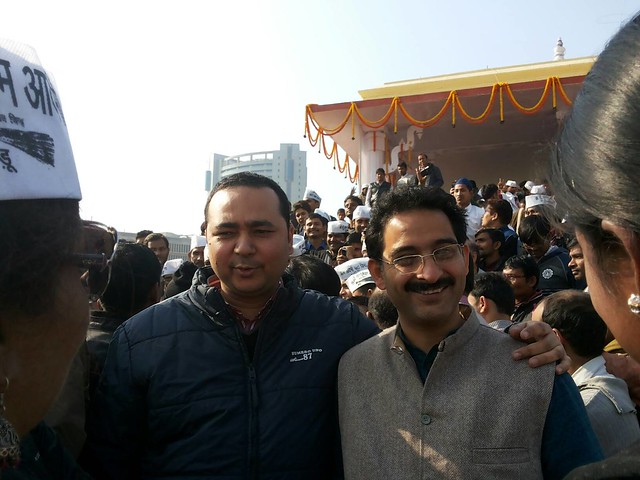By TwoCircles.net staff reporter,
New Delhi: With 2014 Lok Sabha elections in mind, a group of activists and organizations have come together to “defeat communal forces in 2014 General Elections.”
The platform for secularism is called Janvadi Vichar Andolan, Bharat (JAVAB). The announcement was made yesterday by Lalji Desai (Jameen Adhikar Andolan – Gujarat (JAAG)), Indu Kumar Jani (Editor Naya Marg), Rajnibhai Dave (Editor Bhoomiputra), Gagan Sethi (Janvikas), Manan Trivedi (Anhad) and Shabnam Hashmi.
The Andoland will have “twin agendas of countering communal forces in the forthcoming elections and advocating for a truly inclusive society, politics and economics.”
Full statement
Defeat Communal Forces in 2014 General Elections
The general elections are but a few months away. Many of us have been working for years in the field of human rights, health, water rights, land rights, Dalit/Adivasi rights, women’s issues, civil rights. Many of us are writers, academics, teachers, students, activists. While we may think of our work as deeply political, we have not been engaged directly in politics, or at least electoral politics. 2014, however is different. The danger of communalism is imminent. The portends are dark already. As we inch closer to the elections, the façade of development talk is forgotten and an unabashed Hindutva agenda begins to unfold. Uttar Pradesh is the best illustration of this.
As has been said by election watchers, political analysts and commentators, the fate of the avowedly communal political force, the Bharatiya Janata Party, is tied to its electoral fortunes in the state of UP. The arrival of Amit Shah last year as the BJP’s UP in charge coincided with the heralding of the old style communal propaganda. These are again – as earlier – matched by their real ability to foment violence, engineer riots, and drive vulnerable minority groups out of their homes and villages. Muzafarnagar burnt. But the entire belt of Western Uttar Pradesh remains on edge, the traditional unity between Jats and Muslims fractured because of cynical political calculations.
The success in Muzafarnagar may be attempted to be replicated elsewhere. As communal polarization becomes the sole guarantee of electoral success, tensions will be deliberately infused in places, which have witnessed communal peace and harmony in the past. In such a scenario, we are experiencing a restlessness and anxiety. We feel that we need to intervene urgently to the best of our ability to ensure the defeat of communal forces. Indeed, the danger is far greater than simply the threat of communal takeover. The manner in which activists have been targeted by registration of vindictive FIRs for pursuing the legal process in the case of 2002 pogrom; the muzzling of all dissent, provides a glimpse into the authoritarian vision of this communal force. Indeed, the very existence of liberal, democratic and secular consciousness seems to be under assault.
Activists, academics, artists, writers and social workers are coming together to form a National Platform for Secularism called JANVADI VICHAR ANDOLAN, BHARAT ( JAVAB) with the twin agendas of countering communal forces in the forthcoming elections and advocating for a truly inclusive society, politics and economics. This Platform will be guided by the sensibilities forged in our collective struggles for dignity of dalits, the rights of Adivasis and other marginalised communities (pastoralists, fisherfolk, landless wage labour, informal and casual labourers), gender justice, the battles of the working class, increasingly fissured and invisibilized; mobilizations for a more equitable and sustainable development, environmental movements, as well as the democratic aspirations of peoples everywhere in the country.
While we are not aligning with any particular party, it will be our effort to appeal to all secular forces to ensure that the anti-communal vote does not splinter. But more than that this, the platform will work in some select constituencies to repel any communal polarization through its grass roots campaigns and meetings right up till the elections.
Many people from across India have already endorsed this platform. Over the next ten days we will be contacting individuals and groups across India to join us. We will release the addresses of offices across India by January 30 and have a website functioning so that people can join the platform.
This platform will have local branches in select constituencies. The local committees will conduct door to door campaigns, hold aman panchayats, foster dialogue between communities, ensure that people’s issues remain at the centre of the election campaign, and be vigilant against any communal-fascist propaganda.
We are calling upon all democratic and secular citizens, groups and networks to join this Platform.
Aban Raza, painter, Delhi
Aisha Siddqui, Lucknow
Amit Sengupta, journalist, Delhi
Anand Patwardhan, Film maker
Asad Ashraf, Jamia Students Solidarity Forum, Delhi
Asad Zaidi, publisher, Delhi
Bhavana Ramrakhiani, Convenor, Ahmedabad Community Foundation
Bhavna Sharma, service, Delhi
Deepti Raju, senior activist, Ahmedabad
Dr Harshvardhan Hegde, surgeon, Delhi
Dr. Dilip Borah, Gauhati University, President Assam Sahitya Sanmilanee
Dr. Indrajeet Bezbaruah, Lumding College. Writer, Social activist.
Dr. Sabeeha Anwar
Dr. Subash Barman, Secretary, Assam college Teachers, Association, Goalpara
Dr.Monirul Hussain,Gauhati university
Emanuk Haque, Secretary, Bhasha o Chetana Samity, West Bengal
Gaurang Raval, Sauhard, Ahmedabad
Hafiz Ahmed, Convener, All India Secular Forum, Assam.
Harinesh Pandya, Janpath, Ahmedabad
Harsh Kapoor, South Asia Citizens Web
Indukumar Jani, Journalist, Editor Naya Marg, and senior activist, Ahmedabad
John Dayal, Catholic Union
Kedar Misra, writer, poet, Orissa
KN Panikkar, Historian, Kerala
Lalji Desai, senior activist, Ahmedabad
Madhumita Ray, activist, Orissa
Mahesh Bhatt, Film director
Manan Trivedi, activist
Manisha Sethi, academic, activist, JTSA
Manisha Trivedi, ANHAD
Mansi Sharma, activist, Delhi
Mohan Rao, Academic, Delhi
Mohd Aamir, Anhad
Mona Das, Academic, Delhi
Muniza Khan, Lucknow
Nandita Narain, Associate Professor, Dept of Maths, St. Stephen’s College.
Naresh Saxena , Lucknow
Navaid Hamid, Secretary, Peoples’ Integration Council
Noorjehan Safia Niaz-BMMA, Mumbai
Pankti Jog, RTI activist, Ahmedabad
Persis Ginwalla, social activist, Ahmedabad
Pralayan Shanmuga Sundaram - theatre actor, director, Chennai
Prof Rooprekha Verma, Saajhi Duniya, Lucknow
Prof. Mohini Manglik, Lucknow
Prof. Ram Puniyani, writer, activist, Mumbai
Rajnibhai Dave, Editor Bhoomiputra and senior activist, Ahmedabad
Rahul Govind, Academic, Delhi
Raju Deepti, senior activist, Ahmedabad
Rakesh, Lucknow
Sagar Rabari, senior activist, Ahmedabad
Sahir Raza, cinematographer, Mumbai
Sanghamitra Misra, Academic, Delhi
Seema Mustafa, journalist
Shabnam Hashmi, activist
Sohail Hashmi, film maker
Sukumar Muralidharan, journalist
Suman Bhattacharyaya, media professional, Kolkata
Tanveer Nasreen, Associate Professor History, Kolkata
Tanvi Soni, activist, Gujarat
Tanweer Fazal, Academic, Delhi
Tarique Anwar , journalist, Delhi
Vijay Bharatiya,
Vivan Sundaram, artist, Delhi
Zakia Soman-BMMA










%2Bin%2Bthe%2BDelhi%2Belections.jpg)








